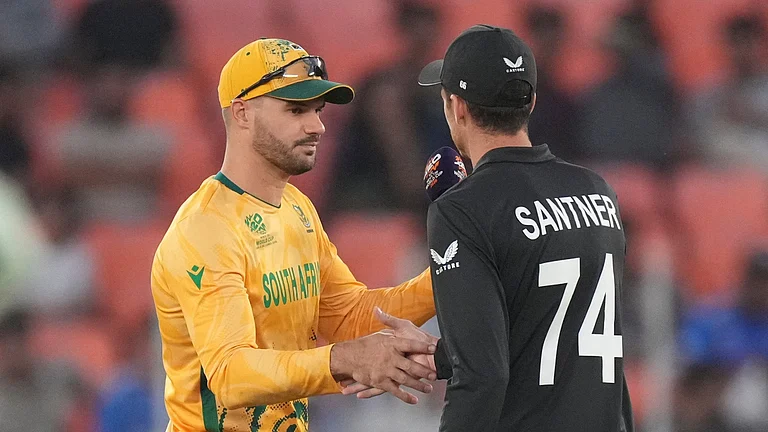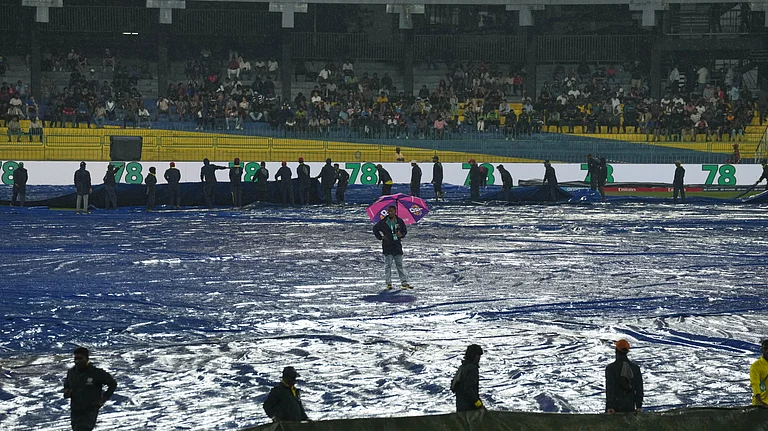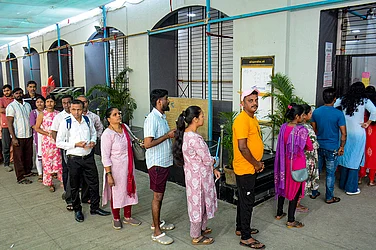Aam Aadmiwards
- BJP launches, with parivar’s backing, a ‘reach-out-to-the aam aadmi’ programme.
- The three-month programme entails three initiatives: garib panchayats, lok panchnama
sessions and reaching out to families of security personnel killed in Naxal attacks - The garib panchayats, to be held countrywide, are part of the BJP’s agitation against price rise.
- The lok panchnama will involve “raids” on FCI godowns to expose how foodgrain is rotting.
- Party insiders say that the programmes are yet to take off.
***
Call it a new approach under a new leadership or the desperate move by a floundering party to steal the thunder of its principal opponent. Others may see it as going back to the basics—to the days of countrywide yatras and dharnas to establish a direct connect with the people. And why not? It did once pay dividends. So what if some of the language on display is reminiscent of parties a bit to the left?
The BJP, which has for some time been thrashing about for new ideas, has reached right into the Congress’s socialistic lexicon with its three-month ‘reach-out-to-the-common man’ programme. The initiatives include garib panchayats, lok panchnama (public audit) sessions and reaching out to the families of security personnel who have been victims of Naxal violence. The vocabulary is aimed right at the aam aadmi—a social base the Congress likes to claim ownership of.
The strategy, announced on August 6 and bearing the stamp of party chief Nitin Gadkari’s approval, looks sound on paper. The Sangh too has weighed in with its suggestions for the outreach programme. It helps that the RSS, which was never especially comfortable with the India Shining approach of the nda years, has an orientation that melds well with Gadkari’s Antyodaya programme. Its stated objective: “To reach out to the last person on the social ladder, focus on giving priority to the last person in the queue, where every BJP member would be actively associated with at least one vikas (development) and seva (service) project in his or her area of work.”
But this is exactly where the problem for the party begins. Almost two weeks after its launch, nothing really has taken off on the ground. BJP workers in the states have little updates to offer on the programme. Many in the districts that the garib panchayat programme is supposed to reach have no more than a sketchy idea of the new goal and mode of operation. A detailed plan is yet to be worked out, say party insiders.
Even while reeling off the platitudes, karyakartas sound apologetic. Pleads a party worker in Uttar Pradesh: “We will go to every panchayat, every ward, every basti and even slums and explain to the people that price rise is not because of lack of foodgrain in the country but because of bad foodgrain management by the government. We have a panchayat tomorrow, but if you come back to us next week, it would be better.” Others concede things are “yet to take off”.
One party leader begs to differ: “It will be too soon to actually write it off. Give it some time. The programme has just been announced and will go on for three months till October. Districts have their own dynamics and all of that needs to be taken into account.” Perhaps so. But the note of caution and doubt also comes from within the party. Some feel the BJP has always had problems sustaining agitations and programmes that run outside the ambit of its patented Hindutva resource pool. “We have some very good ideas, but the follow-up is never good enough,” admits a leader.
While reaching out to the families of CRPF personnel—a brainchild of leader of the Opposition Sushma Swaraj—began in April, soon after 76 personnel lost their lives in Dantewada, the strategy for the agitations against price rise was decided at a meeting chaired by Gadkari this month. In attendance were party office-bearers, front presidents and state unit presidents, directly in charge of holding meetings on price rise in their states. Announcing the series of agitations on August 6, BJP general secretary Ananth Kumar charted out the overall map. “Party workers will hold garib panchayats at the grassroots to involve the common man on issues like rotting foodgrain in FCI godowns. We will also hold lok nirikshan (public inspection) of FCI godowns across India to inform the common man about the state of affairs of the public distribution system.”
The ‘common man’ is that same fuzzy entity that seemed to have turned against the party in the last two general elections. In fact, the BJP’s seat share has been on a consistent downswing since the impressive win of 1999, when it won 270 seats to the Lok Sabha. The worst performance in the last 15 years was in 2009 when it got only 159 seats, 29 less than even 2004 when it won in 188. In fact, in UP, a state which was the party’s bastion in the ’90s and which is now readying itself for assembly polls, the BJP’s voteshare has slipped to under 20 per cent for the first time since 1989.
The dwindling numbers, say party insiders, have made even the RSS sit up and take notice, forcing it to work out a new, pro-people strategy. A series of parivar meetings have laid the emphasis on finding a new connect with the post-rath yatra and Ramjanmabhoomi generation. Insiders confirm that the RSS is keen to bring the young lot into its fold. Accordingly, pracharaks have been advised to work on the Sangh’s new programme to “get in touch with the new generation”. The idea is to reach out right down to the district and tehsil level.
Looking after the needs and problems of families of security personnel killed in Naxal attacks is of a piece with this approach: an intervention that embraces the new humanist approach with no harm done to its nationalist credo. But with its MPs busy with the monsoon session, it has taken a backseat. After the initial round of visits after the Dantewada attack, little has moved. P. Muralidhar Rao, party national secretary, has only recently been entrusted with formulating a policy for reaching out to the Naxal-affected families. Offering a lead in this direction is Gadkari himself. The party chief took it upon himself to personally write to each of the families of the 76 CRPF jawans killed in the Dantewada attack in April.
Perhaps high-minded words may not be enough. For a party looking for a real reach, there needs to be more than just plans on paper. As Gadkari once told his partymen, “We are all optimists but our optimism is not, and cannot be, just a pious hope.”

























